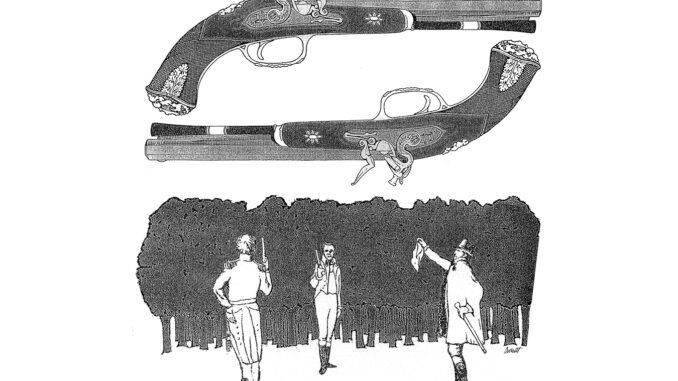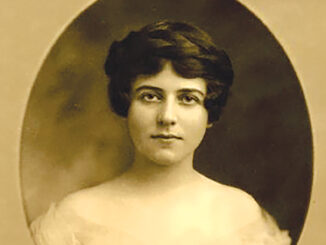
HONOR… such an intriguing word… and certainly versatile. “Do you promise to love and honor each other… the high school honor roll… our speaker tonight, the Honorable Speaker of the House… I’ll tell no one, on my honor… it will be hung in a place of honor… his honesty is not in question… I will honor the terms of the contract… it is a matter of honor… I will protect your wishes and honor your word.” The Latin word “honor” has certainly come down through the ages still meaning respect, dignity, or glory in whatever circumstances one finds themselves.
Honorable conduct has been taught and instilled in every known culture, according to historical records, especially among the aristocratic of a generation. To such as these, honor means more than life itself. Records recall the Asian tribes of the third century were concerned with the nobility of their behavior, however, it appears the French (by 1410) and Italians lead the way in developed, civilized ways a gentleman can get out from a savage vendetta by means of a deadly art following an agreed code of dueling. Dueling still remains a means of solving disagreements in some areas of the globe.
Dueling came to America quite early. Massachusetts recorded the first duel in 1621 between two servants fighting not with guns but with swords. Early in its American records, duels were fought with swords or with rifles before the sacred aristocratic use of the flintlock pistol was used. Dueling was in the states to stay, although several prominent leaders spoke against it. George Washington abhorred the practice. Benjamin Franklin called it a murderous practice. Alexander Hamilton of the Founding Fathers lost his life in a duel with Aaron Burr.
State governments tried to change the impact of dueling addressing the problem by enacting laws to curb its influence. Added to the law was a pledge that individuals wanting to be in government positions must take an oath they had never been in a duel or assisted at a duel. Individuals favoring dueling compared it to street fighting, with knives slashing and guns blazing, so they considered duel to be de facto duel also, and it enabled participants to skirt the laws. Since honor meant more than life, a large number of de facto duels occurred during its 75 years of history in Kentucky.
Surprisingly, many of this state’s duels occurred not in Kentucky but in known dueling grounds just across the state line in Indiana and Tennessee. One on Kentucky grounds included the well-known Andrew Jackson and Charles Dickinson, another Nashvillian – a well-known planter’s son who was recognized as an experienced duelist. Andrew was a fiery up-and-coming attorney. Dickinson’s often repeated “ungentlemanly” remarks about Andrew’s wife, Rachel and the resulting gossip gave the Jacksons a rough time. Thus, the duel was scheduled on the dueling grounds just across the state line three miles from Adairville, Kentucky. On the word “fire,” the duel expert Dickinson fired several quick shots into Jackson’s heart. Jackson remained standing still with his time to fire. Disbelief marked the duelist, causing him to walk off his mark and he had to be ordered back in place by his “second.” Andrew was injured, but not fatally. He had prepared himself with heavy underclothing which shifted where his heart was believed to be. He was wounded in his side only. Dickinson died of his wounds a day or so later.
Jackson received both acclaim and scorn because of his actions at the duel. Many felt he should have ended the duel in the noble way the Henry Clay-John Randolph duel ended. Their first shots failed. On the second attempt, Clay’s bullets pierced Randolph’s coat. Tense moments resulted as Clay had to stand and receive his opponent’s fire. The unpredictable Randolph raised his gun above his head and fired, saving the life and valuable future services of Henry Clay. The historical records of the state reflect interesting details of other notable duels like that of Thurston and Harrison, two Justices of the Peace officers in Louisville. Debating over a 12½ fee due to Thurston, the duel setting was arranged. After a silver dollar was tossed out to determine the details, the group went into a huddle and decided instead to hold a shooting match for a gallon of whiskey – the result was that everyone got half-shot. Amusing, serious, deadly, inexcusable, and sad describe the stories of dueling in Kentucky.
Of interest to residents of South Central Kentucky were the stories from the nearby dueling grounds. The Jackson-Dickinson event helped to focus attention to this area. The surrounding land was where the Louisville-Nashville Railroad staged a loading zone. The fertile land contained large plantation-like farms which were very productive and in need of the railroad services and the 31-W stagecoach route. Many distinguished men and women traveled the old road past Mitchellville since it was one of the main highways from the North to New Orleans. North of Old Mitchellville, about half a mile away, is the Tennessee/Kentucky state line where the state line takes a V-dip on the map. Nearby is the Sanford Duncan Tavern where General Sam Houston spent several days before his duel in which he shot General William White on September 26, 1826 in the dueling grounds nearby.
Dueling had increased among America’s upper classes by the first decades of the 1880s. It seemed preferable to the rough and tumbles of earlier times in the frontier. In early days, street fighting with knives and guns was known as de facto dueling and was a major concern of the Kentucky Assembly. As early as 1799, the Kentucky General Assembly enacted laws against dueling. The laws imposed disqualification for office for a period of time – a provision ambitious politicians dreaded. Yet between 1790 and 1867 forty-one duels took place in Kentucky, many across state lines. Finally, the state’s fourth and present constitution of 1890 banning would-be elected officials from participating in duels sent a powerful message about proper ways of settling disputes. The end of dueling became a matter of politics instead of personalities protecting their honor.
-by Mary Alice Oliver
About the Author: Mary Alice Oliver is a Bowling Green native who is a 1950 graduate of Bowling Green High School. She retired from Warren County Schools after 40 years in education. Visiting familiar sites, researching historical records and sharing memories with friends are her passions.







